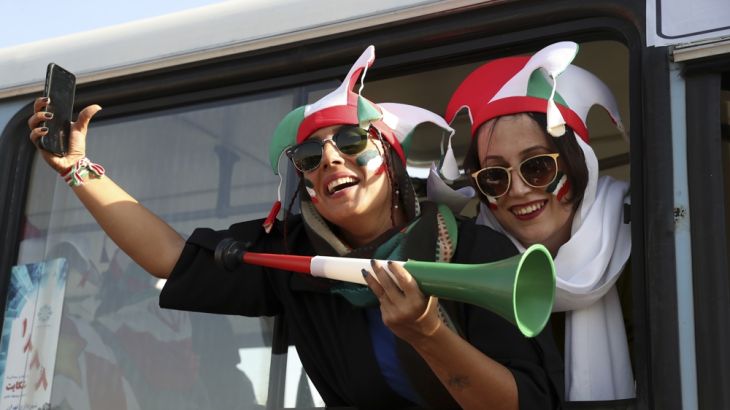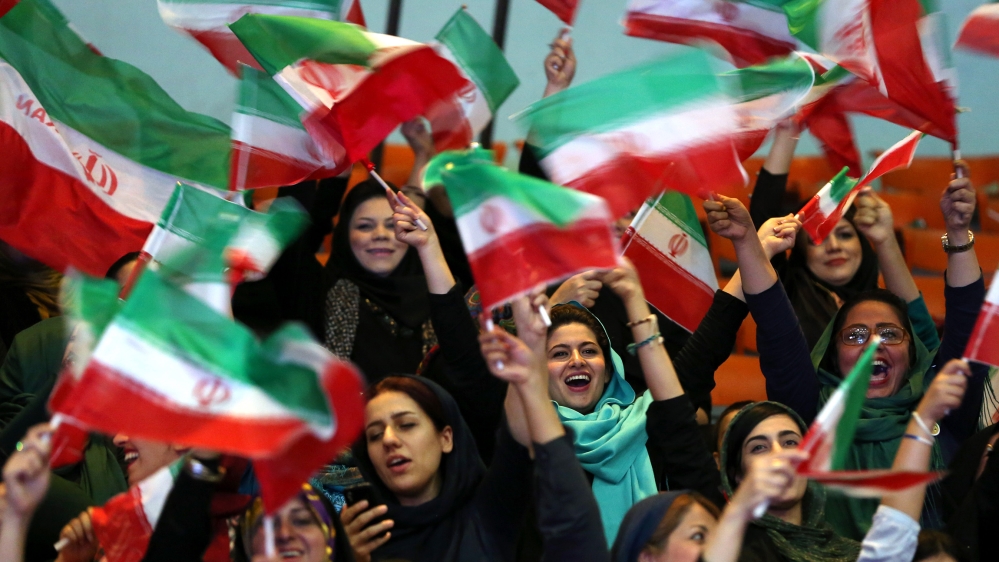‘Taking back what’s ours’: Iran’s women to attend historic match
After decades of struggle, female football fans say their presence at World Cup qualifier is just the beginning.

Armed with a flag and a horn, Niloufar* is about to do something she has never done.
Come Thursday afternoon, the 36-year-old translator will be setting foot on Tehran’s Azadi Stadium – but she will not be there for the football. Instead, her goal is to claim a “simple and basic right” as for the first time since the establishment of the Islamic republic in 1979, Iranian authorities have allowed women to buy tickets to attend a men’s football match.
Keep reading
list of 4 itemsHolders Man City go out of Champions League on penalties to Real Madrid
Barca crash out as Mbappe brace leads PSG to Champions League last four
Saudi reviews football fan rules after whip attack
“I can’t deny how happy I am to finally be able to go to the stadium, and I know I will be very emotional once there,” she said.
“It feels great to take back what’s yours.”
Along with Niloufar, segregated from a usually loud male crowd that has long monopolised the 79-000-capacity venue, more than 3,000 other women will be cheering on as the Iranian national team takes on Cambodia for the World Cup qualifier.
The first 850 tickets allocated to women were sold out in “a few minutes”, leading the Iranian football authorities last week to put more on sale.
‘Blue Girl’
Pressure on Iran to allow women to attend men’s football matches increased last month following the death of Sahar Khodayari, which sparked widespread outrage. The 29-year-old, dubbed “Blue Girl” online due to the colour of her team’s jersey, died of her wounds after setting herself on fire outside a Tehran court upon learning she could be imprisoned for attempting to sneak into a stadium disguised as a man.
“What happenned really hurts the hearts of all Iranians,” Voria Ghafouri, the captain of the Esteghlal team, told Al Jazeera, adding that by paving the way for women to enter stadiums Blue Girl “will be remembered for ever.”
While it has never been a law, the ban on women attending men’s football matches has been enforced since 1981 as part of a set of rules that discipline women’s dress and presence in public spaces, according to the Iranian authorities’ interpretation of Islam. The country’s conservative leaders have also pointed to sports facilities not being appropriated for women as part of their reasoning for the move, citing the lack of female restrooms.
The ban, which also extends to volleyball and basketball matches, has been momentarily relaxed in the past, but activists concur that the match on Thursday is a “first official step forward”.
Their enthusiasm, however, of women being allowed to buy tickets just like men was swiftly tempered by the imposition of a cap limiting their attendance to just five percent of the venue’s capacity.
“As a matter of human rights and according to FIFA’s own statues, the cap must not be in place,” Minky Worden, director of global initiative at Human Rights Watch, said.
“That is gender discrimination which creates risks.”
Meanwhile, questions loom over what will happen to those women who are expected to show up at the stadium, even without a ticket.
“I prefer to be realistic because we have already been through a lot – from beatings, to arrests, to self-immolations,” Niloufar said. “So why not be worried?”
Years-long fight
Often coming at a high cost, the women’s fight against the ban – one of many undertaken in recent years by activists defying such practices or laws with acts of civil disobedience – stretches back many years.
“We would go to protest at every single national match,” recalled Sara, a member of the OpenStadiums network of feminists, activists and journalists, who began demonstrating in front of Azadi Stadium in 2005. “Sometimes they [the authorities] would beat us, throw us punches, kicks or arrest us.”
In 2006, after top clerics adopted a harsher rhetoric over the ban and the authorities’ response became more violent, OpenStadiums began documenting police behaviour, sending recorded materials and signed petitions to FIFA, the world football’s governing body, and the Asian Football Confederation (AFC).
“It was hard to put our voice out there because there were no social media,” Sara said.
In 2013, she decided to create the OpenStadiums Twitter account to attract the attention of former FIFA President Sepp Blatter before his arrival in the Iranian capital for a game.
Blatter later said that in a meeting with Iranian President Hassan Rouhani during his Tehran visit, he urged him “to consider that half of the nation who can’t attend the match”. Blatter’s successor, Gianni Infantino, has also mentioned the ban during talks with Rouhani.
‘FIFA is responsible’
But Iranian activists have long expressed disappointment with FIFA over their perceived failure to force change despite a number of petitions. And now, some fear the Iran-Cambodia match could turn into a publicity stunt to sedate international pressure in the wake of Khodayari’s death before the ban is introduced again.
In June 2018, following the detention of several female fans at a game between Iran and Syria, Infantino wrote a letter to Iran’s football authorities giving them a July 15 deadline to take “concrete steps to ensure that all Iranian women will be allowed to buy tickets”.
Yet no concrete action followed. Then in November 2018, Infantino flew to Tehran for the AFC tournament final where some 800 women were selectively invited to attend the match. The FIFA president described their presence as “great progress”, but activists decried it as a “show” to please the international guest as the ban was reimposed straight after his departure.

Meanwhile, Infantino’s reaction to Khodayari’s death – a statement affirming the institution’s “clear and firm” position that “women have to be allowed into football stadiums in Iran …for all football matches” – left activists expecting tougher action unimpressed.
“FIFA is responsible for Sahar’s death. They are responsible for the fact that I don’t feel secure in my own country,” OpenStadiums said. “They could have taken serious actions years ago, but they never did”.
The world body has never penalised Iran, despite its own statutes and human rights policy stating that any discrimination against women “is strictly prohibited and punished by suspension or expulsion”.
“They should have simply followed their own rules” says Maryam Shojaei, a women’s rights campaigner and the sister of the captain of the Iranian national team Masoud Shojaei. “They should have suspended the Iranian Football Federation as this is the only option they would have taken seriously.”
FIFA did not respond when asked about its readiness to sanction Iran if the country fails to lift the ban beyond Thursday’s match, pointing to a statement it released following accusations by Iranian activists of lack of proper action.
“FIFA announced that it will, based on the operational plans and results of the 10 October 2019 game, collaborate with the FFIRI in developing an operational protocol and related requirements for matches in the Iranian football league to be opened for women as well,” the statement said, referring to the Football Federation of the Islamic Republic of Iran.
‘We are moving ahead’
Amid increasing international attention before Thursday’s match, the current administration led by Rouhani, the Iranian president, appears to be in favour of the ban being lifted.
“I think we are moving ahead,” Masoumeh Ebtekar, Iran’s vice president of family and women’s affairs, told Al Jazeera. “I think the government has made serious efforts to that end and now we hope to see a game where we have women sitting in the stadium.”
|
|
But the government has to deal with the opposition “from conservatives, hardliners and some religious groups that are strong enough to create many problems along the way”, Saeid Jafari, a political analyst, said.
On Monday, about 50 religious hardliners demonstrated outside Iran’s parliament, chanting slogans against the lifting of the ban.
Yet their opposition does not seem to deter the women who will attend Thursday’s match – and also plan to chant their own slogans in support of their favourite team.
“The poor Cambodian team,” Niloufar says jokingly. “How unfortunate for them to have to face not only the Iranian footballers, but thousands of impassioned Iranian women.”
*Some names have been changed to protect identities